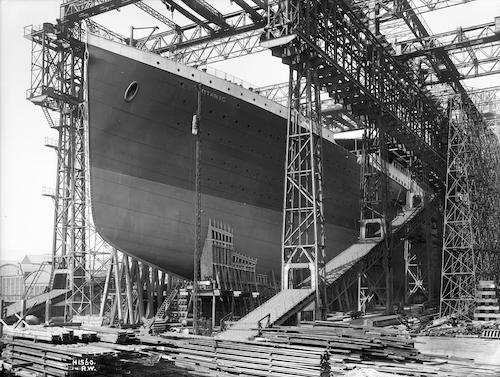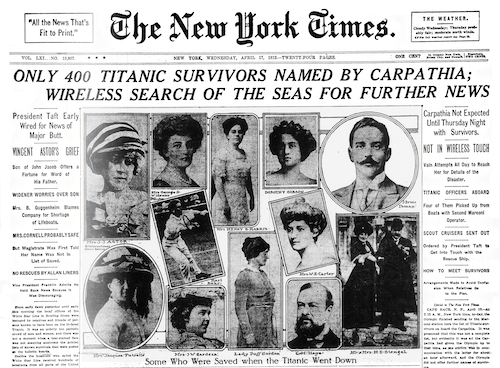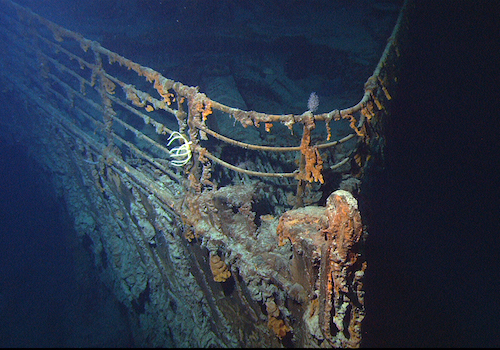Communiqué
“Mystery Ship” turned away from Titanic in darkest hour; SECRETS OF THE DEAD: “Abandoning the Titanic,” May 31 at 10 pm
< < Back toSecrets of the Dead: Abandoning the Titanic
Wednesday, May 31 at 10 p.m. on PBS, pbs.org/secrets and the PBS Video app
The sinking of RMS Titanic on April 15, 1912 is one of the deadliest peacetime maritime disasters in history. Mainstream retellings of the tragedy often overlook that the “unsinkable” Titanic was not alone when it sank. A mystery ship was spotted within view of the sinking ship, but instead of sailing closer to aid the drowning passengers, the mystery ship seemingly ignored a fusillade of rockets and signals and sailed away. American and British inquiries accused the SS Californian and its captain, Stanley Lord, of abandoning the Titanic. Decades later, the discovery of Titanic’s wreck exonerated Lord and the Californian’s role in the disaster, re-opening accounts that implicate another ship.

In Secrets of the Dead: Abandoning the Titanic, join a team of investigators as they search for the identity of the mystery ship that turned away from the Titanic in its darkest hour, abandoning thousands of lives to the icy waters and their untimely demise.
Film Interviewees:
- Charles A. Haas – Titanic Historian and Author
- Caroline Heaven – Titanic Historian and Lecturer
- Stephen W. Hines – Titanic Author
- David Hutchings – Naval Architect and Titanic Author
- Marc Isaacs – Maritime Law Expert
- Dorothy Kendle – Daughter of Edith Brown (Titanic 2nd Class Passenger)
- Jean Legg – Daughter of Sid Daniels (Titanic 3rd Class Steward)
- Senan Molony- Journalist and Titanic Author
- Bill Sauder – Titanic Historian
- Paul Slish – Titanic Researcher
- Parks Stephenson – Titanic Historian and Naval Officer
- Ronald Warwick – Commodore, Cunard Line (Ret.)
Timeline
- On April 10, 1912, the RMS Titanic departed the English city of Southampton on its maiden voyage heading to New York City. The British passenger liner, operated by the White Star Line, was under the command of Capt. Edward John Smith and carried 1,300 passengers and a contingent of 900 officers and crew.
- Believed to be “unsinkable,” the Titanic was built to withstand a blow from another ship but not an iceberg. Up to the point of collision, the ship was not in an ice field and the icebergs in view were seen at a great distance. Smith was not stationed on the ship’s bridge at the time of collision.

”The New York Times” front-page feature showing some prominent individuals who survived the sinking of the RMS Titanic. Newspaper Archive. - The SS Californian was one of several ships in the area on April 14, 1912. The 440-foot-long ship with general cargo had a crew of 47, headed by Capt. Stanley Lord. Earlier that day, Californian’s wireless operator, Cyril Evans, exchanged messages about ice, weather conditions and its location with other ships in the area. Titanic telegraph operator Jack Philips ignored this message while receiving information from a relay station in Cape Race, Newfoundland. Evans then signed off from the wireless room of Californian.
- At 11:40 p.m. on April 14, 1912, three bells pierced the night, signaling that something lay directly in the Titanic’s path. It was an iceberg and there was not enough time for the ship to turn and avoid colliding with it. In just 30 seconds, Titanic struck the iceberg, then made the fatal mistake of sailing on for another 10 minutes. The water flooding into the damaged hull created tremendous pressure, forcing Capt. Smith to stop the ship.
- Shortly after midnight on April 15, 1912, Titanic’s wireless operators began sending SOS signals to nearby ships. The SOS reached Titanic’s sister ship, the Olympic, as well as Mesaba, Mount Temple, Baltic, Frankfurt, Californian, Virginian, Birma and the eventual rescue ship, Carpathia.
- As lifeboats aboard Titanic were being lowered into the icy waters, a mystery ship, long believed to be SS Californian, could be seen in the distance by passengers, but did not sail closer to Titanic to offer assistance.
- Titanic sank at approximately 2:20 a.m. on April 15, 1912, claiming the lives of 1,500 passengers. With the Californian stopped in the ice before any SOS messages were sent from the Titanic, the ship didn’t see the sinking liner’s calls for help until dawn, hours after they’d been sent. The Californian then immediately headed toward the drowned ship, encountering both the Mount Temple and the Carpathia, which brought 700 survivors back to New York City.
-

View of the bow of the RMS Titanic photographed in June 2004 by the ROV Hercules during an expedition returning to the shipwreck of the Titanic. A mere four days after the tragedy, the United States launched an inquiry into the Titanic disaster, quickly concluding that, based on the testimony of 80 witnesses, Californian was the only ship the Titanic crew and passengers could have seen. However, multiple details, including log tampering and damning testimony from two passengers, suggest the Mount Temple was the mystery ship.
- Both the U.S. and British inquiries determined that the Californian and Capt. Lord could have “pushed through the ice to open the water without any serious risk” and done more to save the passengers on the Titanic. Lord and Californian crew members faced years of criticism for their role in the tragedy; however, no formal charges were ever brought against them.
- Decades later, on September 1, 1985, the wreck of Titanic was found at its true final resting place. A 1992 Marine Accident Investigation Branch (MAIB) report stated, “Californian was between 17 and 20 miles from Titanic at the time of the collision,” matching the navigation calculation from Lord’s testimony, and finally vindicating him and Californian.

